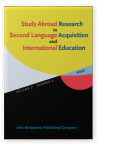Vol. 7:2 (2022) ► pp.181–203
Vol. 7:2 (2022) ► pp.181–203
Blogging for intercultural communicative competence in study abroad programs
All breadth, no depth?
Participants in study abroad (SA) programs (sojourners) are often encouraged to blog as a form of reflective writing, yet little is known about this practice. Generally, reflection facilitates sojourners’ engagement in their personal and professional growth. Drawing from two different but complementary frameworks, we analyzed blogs from 51 sojourners in short-term SA volunteer teaching placements to examine the reflection that occurred through their writing. The two frameworks revealed different aspects of blogging practices: types of reflection (Maarof, 2007) were primarily descriptive, but intercultural communicative competence learning (Elola & Oskoz, 2008) examples were more numerous and varied, documenting sojourners’ navigation of culture in SA. Sojourners did not typically use their blogs for dialogic or critical reflection, instead chronicling experiences or representing reflection as completed actions. Although blogging can be useful for reflection in SA, the results from this study suggest that careful scaffolding may be necessary to encourage critical reflection.
Article outline
- 1.Introduction
- 2.Literature
- 2.1Intercultural communicative competence
- 2.2Reflective writing
- 3.Methods
- 3.1Participants and setting
- 3.2Conceptual lenses and data analysis
- 4.Results
- 4.1Types of reflection
- 4.2ICC learning
- 4.2.1Cultural knowledge – facts
- 4.2.2Coping
- 4.2.3Changing perspective
- 4.2.4Interest in others – specific
- 4.2.5Interest in others – general
- 4.2.6Cultural knowledge – exchange
- 4.2.7Cultural knowledge – resolving misunderstandings
- 4.2.8Cultural knowledge – discovering
- 5.Discussion
- 6.Conclusion
-
References
